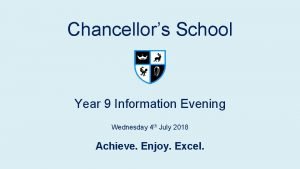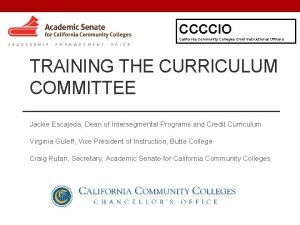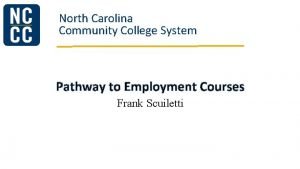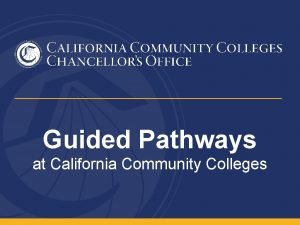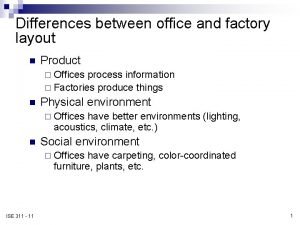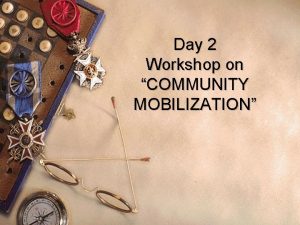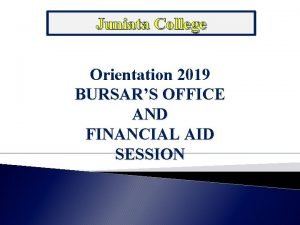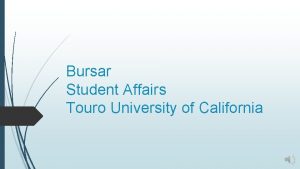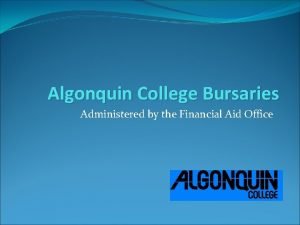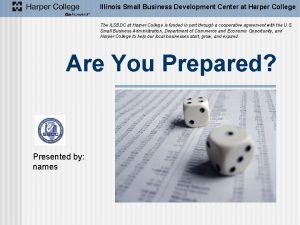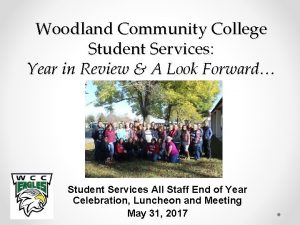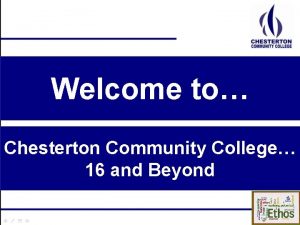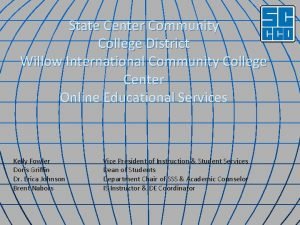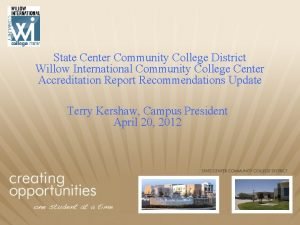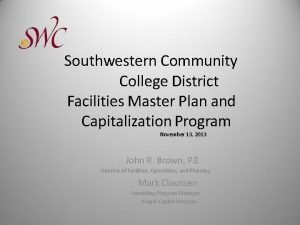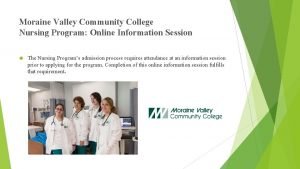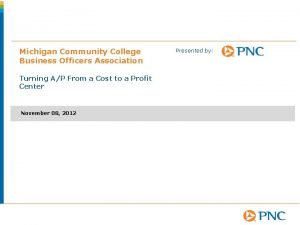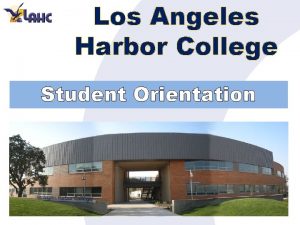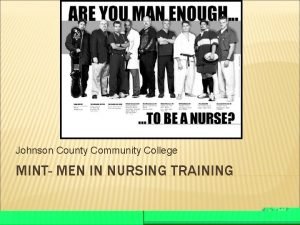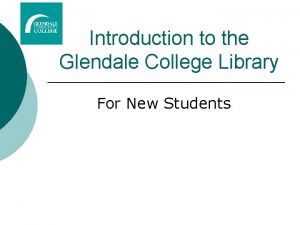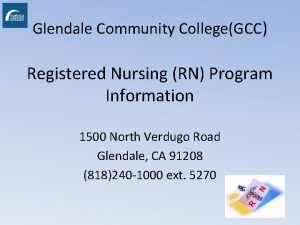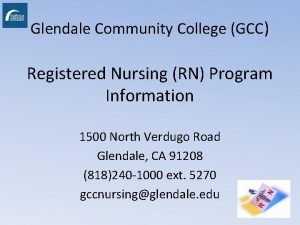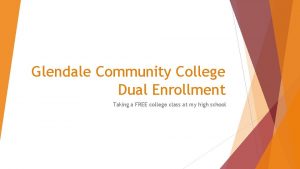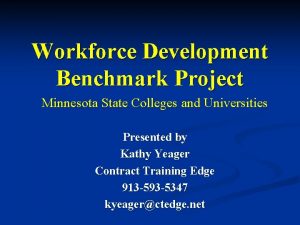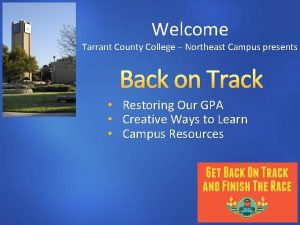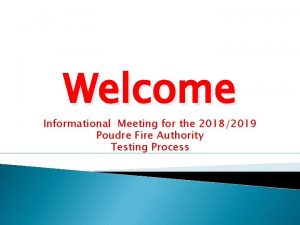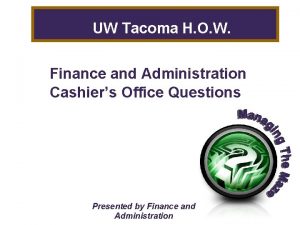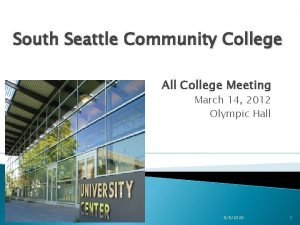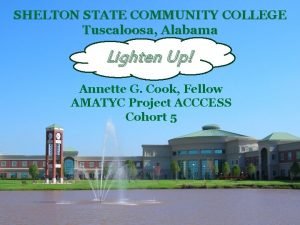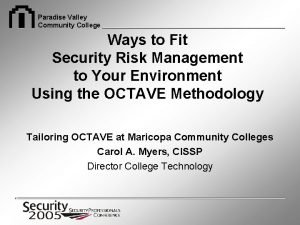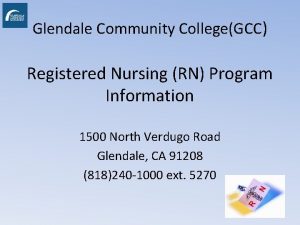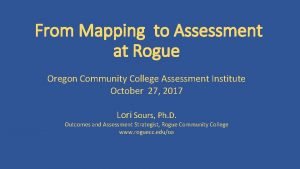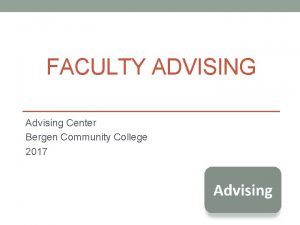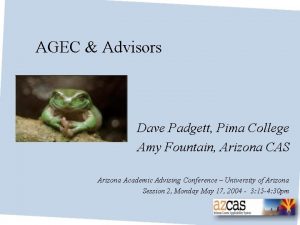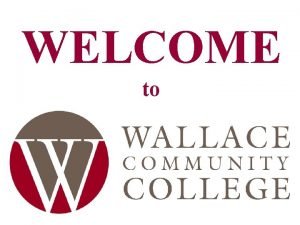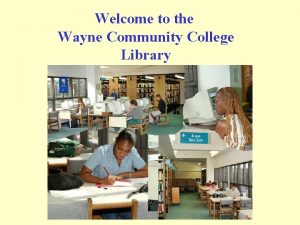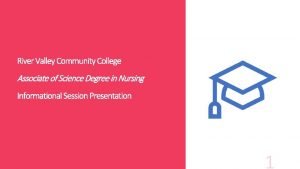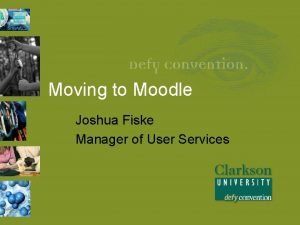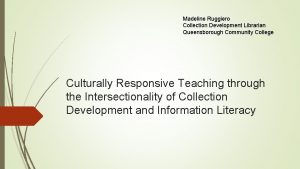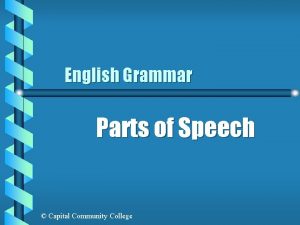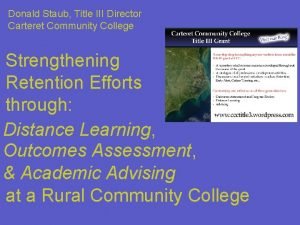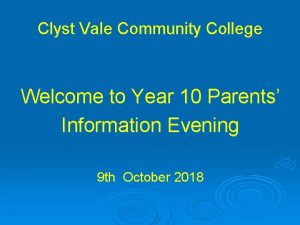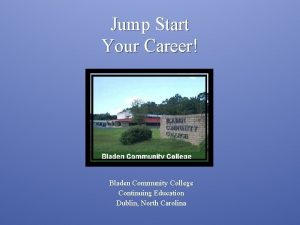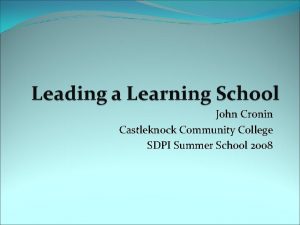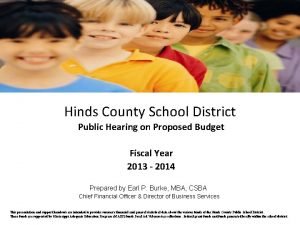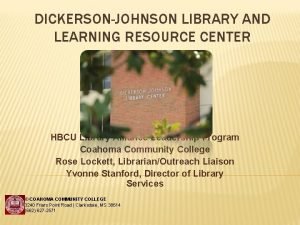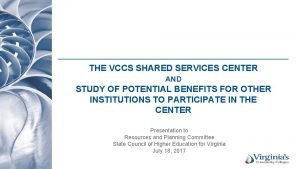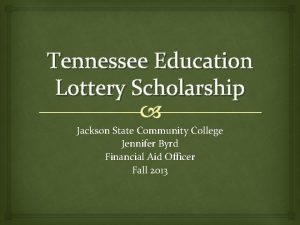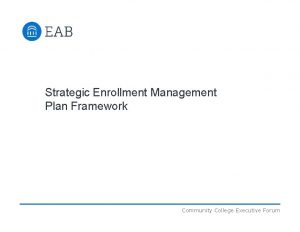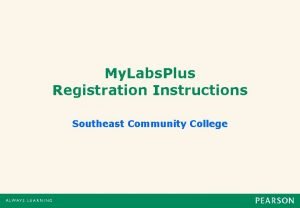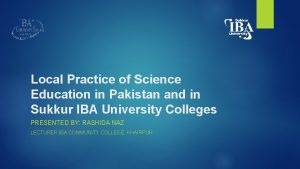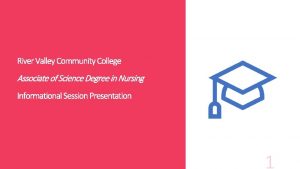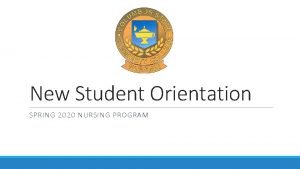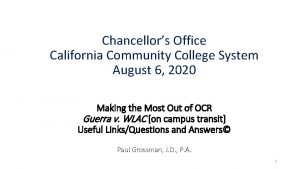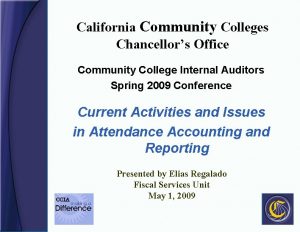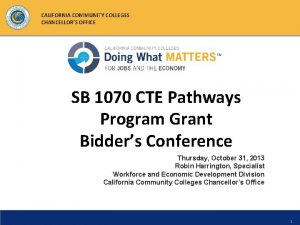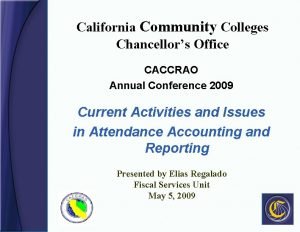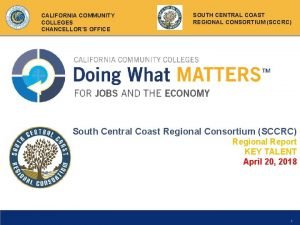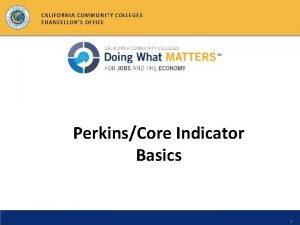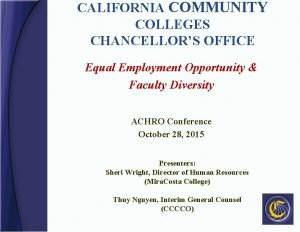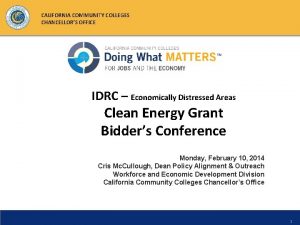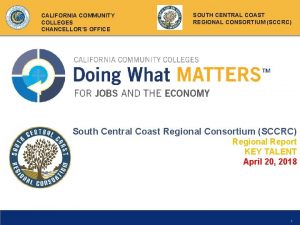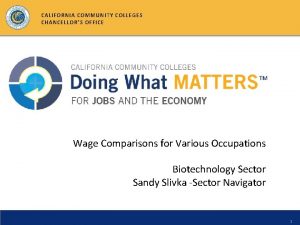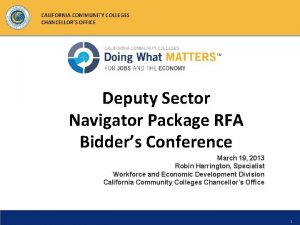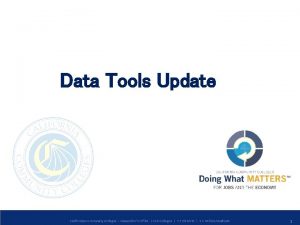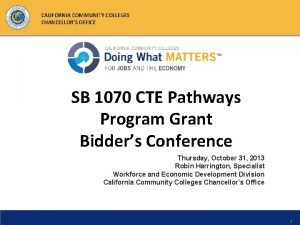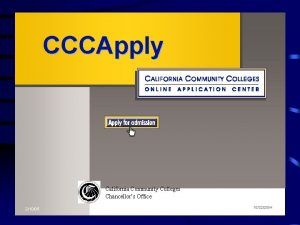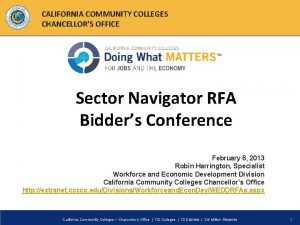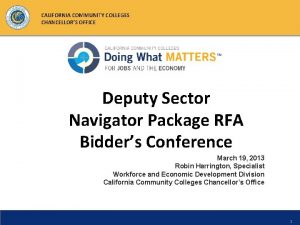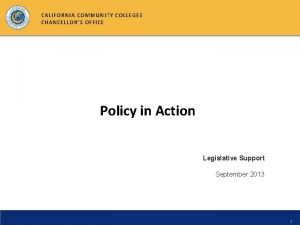Chancellors Office California Community College System August 6


































































- Slides: 66

Chancellor’s Office California Community College System August 6, 2020 Making the Most Out of OCR Guerra v. WLAC [on campus transit] Useful Links/Questions and Answers© Paul Grossman, J. D. , P. A. 1

Good Morning to My Friends Across California to Linda Vann to DSPS Solutions 2

Caveat These materials are provided for informational purposes only and are not to be construed as legal advice. This presentation is primarily based on Federal law. You should seek independent or house counsel to resolve the individualized legal issues that you are responsible for addressing. Further, any policy or procedure additions or revisions under consideration should be reviewed by your college’s legal counsel prior to implementation. N. B. : I no longer carry malpractice insurance. I drive a Corolla. 3

USE AND PERMISSIONS This material has been provided for your personal use across your campus. To share it across your campus you are welcome to make photocopies or convert the format to make it accessible to persons with visual impairments who use adaptive technology such as JAWS or Zoomtext. Any other form of duplication or distribution requires the written consent of Paul D. Grossman, J. D. No consent is provided to distribute or republish this document, in whole or part, through digital information technology such as the Internet or any Internet platform such as You. Tube. No copyright is claimed as to the works of others 4

Today’s Agenda Three Timely Topics

Three Timely Topics (1) • Making the most out of OCR • Before OCR receives a complaint • OCR standards for opening and closing a complaint • If OCR opens an investigation concerning your campus: response strategies • Short-cuts • Findings • Resolution • When there are no shortcuts 6

Three Timely Topics (2) • Guerra v. WLAC • • • Foundation: “program as a whole”/”accessible in its entirety” Kirola v. San Francisco Background facts District Court, dismissal in favor of WLAC 9 th Circuit, reversal in favor of the students Does the decision of the 9 th Circuit in Guerra mean that every campus must provide on campus accessible transit for students with mobility impairments? 7

Three Timely Topics (3) • Why answer to any question about COVID-19 must be tentative • Places to look for answers: State and Federal published guidance + DSPS Solutions 8

I. Getting the Most Out of OCR 9

A): Before OCR Ever Receives a Complaint 10

Develop a Relationship with OCR (1) • Seek technical assistance from OCR before any complaint is filed • Problem solving: make a call to OCR and raise a scenario before there is a complaint --- not after • Invite OCR onto your campus to conduct training (it’s free!) • Meet OCR rep’s at AHEAD and CAPED events 11

Develop a Relationship with OCR (1) • Subscribe to DCHE and read OCR letters in the “reading room” and learn how OCR analyzes issues, e. g. , “process, process” • Along with your attorney, become familiar with the latest version of the Complaint Processing Manual • A must if a complaint is headed your way • OCR’s latest case processing manual (November 19, 2018, as updated), is found at https: //www 2. ed. gov/about/offices/list/ocr/docs/ocrcpm. pdf (last visited August 4, 2020). 12

Don’t Be an Easy Target (1) § Make sure all websites that “face the world” at least comply with WCAG 2 AA or higher including admissions, registration, contact us, etc. § OCR is still accepting complaints in this area § OCR remedial agreements specify WCAG 2. 1 AA § Ensure that the college has readily accessible notice of how to contact DSS and how to qualify for accommodations § Many campuses do NOT meet this simple test § State that all accommodation requests should go through DSS – discourage “rogue” accommodations § Train faculty on this point § Meet with department chair and faculty 13

Don’t Be an Easy Target (2) • Have designated personnel to receive, assign, investigate and respond to internal complaints of harassment/ discrimination/retaliation • A single collection and redistribution point, ensuring that any complaints end up in the right hands can be a very valuable best practice • All personnel with complaint-handling responsibilities should receive initial and ongoing training in their areas of responsibility, as well as proper techniques for conducting civil rights investigations • Note, HR might not be well-trained in how to deal with student complaints 14

B): OCR Standards and Practices for Opening and Closing a Complaint of Discrimination 15

Who Can Complain? • Almost anyone • • Visitors and invitees Potential applicants Applicants Students Parents, if student authorizes, or if the parent was the alleged victim Faculty/staff DSS directors • But • Must have sufficiently specific knowledge of alleged violation to articulate a viable claim • Must be in writing; can’t be anonymous • See CPM section 102 16

Complaint Content (1) • Complaint must state a claim that, based on the credible statements, if true, would constitute a violation of one of the laws enforced by OCR (e. g. Section 504 & Title II) • A loose form of a summary judgement test • Can’t lack “sufficient detail” or be “so speculative” as OCR is unable to determine whether a violation may exist -- who, what, where when • OCR is supposed to provide assistance through TA, in filing and reach out to “clarify” an imperfect complainant 17

Complaint Content (2) • Complaint must be timely • Generally 180 days from date of discriminatory event • Not from when the complainant knew unless deliberate obfuscation by recipient • Different rules for the Age Discrimination Act • Or 60 days after conclusion of an internal resolution process like a grievance procedure • Or 60 days after decision in a due process hearing (IDEA/504) – limited review • Or 60 days after dismissal without prejudice by a court • Most timeliness requirements are waivable at OCR’s discretion but does not happen often • See CPM Sections 106 & 107 18

Discretionary Administrative Closures (1) • OCR may close a complaint when: • OCR determines ability to complete the investigation is substantially impaired by the complainant’s or injured party’s refusal to provide information necessary for investigation of the complaint; • OCR determines its ability to complete the investigation is substantially impaired by its inability to contact the complainant to obtain information necessary for investigation of the complaint • The complainant fails to provide information requested by OCR within 14 calendar days (shortened from 20 days). 19

Discretionary Administrative Closures (2) • A class action has been filed against the same recipient and the relief sought is the same as would be obtained by OCR • The complainant withdraws the complaint • The allegations are moot • The same issues involving the same recipient have been addressed in a recent OCR compliance review (or a recent complaint) • The complaint allegations are foreclosed by previous decisions of Federal courts/Sec’y of Education/OCR policy determinations; • Note that OCR may close a complaint even after opening it • See CPM section 108 • If you think OCR has opened a complaint against your institution that meet’s a mandatory basis for an administrative closure, let OCR know, e. g. , it moot • Discretionary closures is a strategy call 20

C: OCR Comes A’Knockin’ Response Strategies

Responsibilities by the College (1) • Who is responsible for various responsive actions will vary from college to college, but preplanning and knowing who will take on certain tasks may be very helpful • As DSS Director, do your best not to be left out! • Make certain that any disability-related complaints are shared with you • Set an expectation that you will be involved in the whole process • Set an expectation that you will be part of negotiation process 22

Responsibilities by College (2) • Top officials should know of complaint and understand that: • Personal liability does not attach, except for retaliation • Every dime of Federal money may be in jeopardy • OCR can be a very constructive entity but it expects cooperation and even collaboration with regard to designing remedies • Download or request a copy of the latest version of the Complaint Investigation Manual (CPM) https: //www 2. ed. gov/about/offices/list/ocr/docs/ocrcpm. html (posted January 10, 2020 referring to an “updated” November 19, 2018 document) [last visited August 4, 2020] • Consultation with college counsel should commence quickly • Records must be preserved 23

Responsibilities by the College (3) • Someone in authority should caution alleged discriminatory parties against retaliation • Retaliation may be found even when the underlying claim is not sustained • Training should have been conducted on this topic anyway • ADA protections may be considered even broader than those under Section 504 and Title VI as they extend protections to “any individual” including prohibitions against “coercion” and “interference. ” 42 U. S. Code § 2203; 28 CFR § 35. 134 • As set forth in article I, section 111, OCR is required to provide the recipient “a copy of the complaint” • OCR’s complaint? • As permitted in the immediate previous CPM, the student’s complaint? • Ask for the student’s complaint • No harm, unless you fear your institution will engage in retaliation • It will very likely contain redactions, however 24

Responsibilities by the College (4) • Find out who at OCR is investigating the complaint, who is their “team -leader” and work on developing rapport, but note that many discretionary decisions will ultimately be reviewed the Regional Director, and, on rare occasion, OCR HQ in D. C. 25

Responding to Data Requests (1) • Upon receiving notice of the complaint allegations: • Provide a timely response: • On a item by item basis, if necessary, seek extensions of time for providing a response or supplemental responses; consider providing information on a rolling basis • In the more recent versions of the CPM, an arbitrary rule of 15 days for a data response by the recipient is no longer provided • If you need more time, make your case around what is “feasible” • Some items immediately • Some items later 26

Do an Early Settlement Calculation • Based on an those facts you can gather, in house, and consultation among all the pertinent college parties, calculate the value of hanging tough, or quickly seeking to settle, and everything in between • See discussion of Pre-Finding Settlement options below • Include in your continuum of calculations the opportunity to bring about needed reforms by “blaming them on OCR” • OCR CAN BE AN ALLY in bringing about, long overdue, much-needed change 27

Position the College for a Successful Resolution • Likely, OCR will prove resistant to compromise only if the college: • Fails to cooperate with the data request • Reasonable extensions of time will be granted • Generally, students, identities can be coded • However, unreasonable delay may be independent grounds for proceeding to enforcement • Fails to cooperate with scheduling and facilitating an investigation • Section 702 states: “OCR will make efforts to work with recipients to conduct the investigation in a manner that minimizes disruptions to the recipient’s educational environment. ” • Fails to enter into good faith negotiations, if OCR determines a violation(s) exists or states “compliance concerns” • You, your attorney or Chancellor/President behaves in an asinine manner 28

Presence of Counsel (1) • Presence of college counsel during interviews: • Except with regard to “managing officials” and the actual party accused of discrimination, according to OCR, the college does not have the right to have its attorney present at interviews (EEOC/NLRB practices are analogous) • OCR usually will make clear to each witness that: • College counsel does not represent him or her • Any interviewee may have his/her own attorney or representative present during any OCR interview 29

Presence of Counsel (2) • OCR is unlikely to agree to presence of college counsel at the interview of the complainant • OCR may welcome counsel to most interviews if rapport and trust has already been developed between the OCR investigator and the college/counsel • Conversely, OCR need not give notice of everyone being interviewed and may conduct interviews off campus out of sight of the college 30

D): Investigation 31

Scope • Recent Manuals require focusing investigations on “allegations, ” instead of “allegations and issues” or “issues of systemic discrimination. ” • This change was previously announced in OCR’s June 2017 internal “scoping” memo, which included reference to cases concerning sexual violence 32

Information Collection • OCR can rely on evidence from any credible source • OCR, not the college, determines what is “pertinent” (relevant), but. . . use your data response to frame what you see as relevant • OCR has no legal authority (e. g. , subpoena power) to compel anyone except the college to provide information – but OCR may ask college to put “the squeeze” on an employee • OCR has the right of access all records and documents during a college's regular hours to: • School's facilities • Any record maintained by the school that is relevant to the investigation, including records that identify individuals by name • School may redact personal identifiers if doing so does not impede the investigation 33

Preparing for OCR Interviews • Witnesses are advised of their administrative rights prior to any interview; permitted to have a personal representative, as discussed above • OCR may seek to tape record interviews, but may only do so with permission of the interviewee (generally, not OCR’s practice) • OCR may also seek to interview students, subject to parental consent for minors (exception where questions are of a general nature, not related to any specific event, and there are no records kept to identify the student) 34

Preparing for the On-Site § If you can do so, without raising an allegation of retaliation, try to ascertain what all the college’s witnesses are likely to say (particularly find out if they are hostile to the college’s position) § Talk to OCR’s investigating attorney and ensure you understand the factual and legal issues and the applicable regulatory provisions § Determine whethere are steps to take to abbreviate the investigation and narrow the issues (e. g. , acknowledge documents/facts, pin down points of controversy, and so on) 35

E): Pre-Investigation Short- Cuts to Resolution This may be THE most important decision point

What are Key Features of the Two Early Resolution Options? FRBP: Pre-investigation Agreement • Agreement reached between the complainant and the recipient • Complainant is an active participant in developing and approving the agreement • OCR facilitates the ECR process • OCR is not a party to the agreement • OCR does not monitor ECR agreements • But either party may ask OCR to reopen an investigation into the underlying issues One more Option: Make it moot VRA: Voluntary Resolution Agreement • Recipient expresses an interest in resolving the complaint at any time before the conclusion of an investigation • OCR develops the agreement; usually the complainant does not participate in developing and approving the agreement • Depending on when the process starts, there may be limited, not necessarily no findings, in the resolution letter • Agreement is aligned to the allegations in the complaint or the information obtained by OCR • OCR monitors and enforces the implementation of the agreement 37

F): WHEN THERE ARE NO SHORT CUTS OCR’s Primary Tools for Compliance: Investigation and Investigative Determinations 38

Investigative Findings (1) §At the conclusion of the investigation, OCR will determine whether: 1. There is “insufficient evidence to support a conclusion that the college discriminated (or retaliated) as alleged, ” • No more “no violation” findings 2. Or, “there is sufficient evidence to support a conclusion of noncompliance. ” § OCR applies the preponderance of evidence standard. § A letter reflecting OCR’s determination is issued to the complainant(s) and the recipient – they are virtually identical letters 39

Investigative Findings (2) • Non-Compliance determination • Findings are approved by “OCR” • CPM is vague about who the decision-makers are • Once approved, the CPM instructs office to attempt to ascertain and secure the recipient’s willingness to negotiate a resolution agreement • If a resolution agreement is signed, a letter of finding(s) will be sent to the parties with the resolution agreement attached • The good news that, the matter is settled, can mitigate the simultaneously released bad news that, OCR found the college out of compliance 40

Investigative Findings (3) • Non-Compliance determination • If the recipient indicates it is not willing to negotiate a resolution agreement, it will be notified in writing that it has 30 days to indicate its willingness to do so • At the end of 30 days, if the recipient still does not do so, OCR issues a letter of finding of non-compliance and of “Impending Enforcement Action” • OCR may issue an “Impasse Letter” • If negotiations have not resulted in an agreement, the letter will include a description of OCR’s unsuccessful attempts to resolve the complaint – bad publicity for the college – making a record for an enforcement action 41

The Sledge Hammer • Further unsuccessful attempts at negotiation will lead to convening an administrative hearing or, more likely, a referral to the Department of Justice for enforcement in Federal court • While OCR is trying to bring a recipient to the table, it can • Prevent an increase in Federal funding • It can prevent the recipient from getting new grants • If OCR prevails in the hearing, absent congressional intervention, it can stop all Federal financial assistance to the recipient • Upon referral to DOJ, DOJ can obtain all forms of injunctive relief, get damages, and impose fines under the ADA 42

G): Post-Finding Resolution 43

Resolution Agreement to Address A Finding of Non-Compliance Agreement must include: • Specific acts or steps the college will take to resolve compliance issues • The dates for implementing each act or step • The dates for submission of reports and documentation verifying implementation • A statement acknowledging that OCR may initiate administrative enforcement or judicial proceeding to enforce the agreement • OCR must give written notice of the alleged breach and a minimum of 60 days to cure the breech 44

Appeals • Under article III, section 307 of the CPM, the opportunity for complaints to file an appeal, removed in the immediate previous version of the CPM, have been restored, specific to the type of determination made by OCR • No such opportunity has been expressly afforded recipients for a long time • If your campus believes there has been a great miscarriage of justice or denial of due process, it should appeal anyway and after that complain to its congressional representatives • Appeals are supposed to be review by a different region than the one that investigated the case 45

Key Information Sources (1) • Subscribe to Wiley and sons, Disability Compliance in Higher Education (DCHE) http: //www. disabilitycomplianceforhighereducation. com --- Note: the DCHE database is available through AHEAD membership at no additional cost • DSPSsolutions@interwork. sdsu. edu or at (877) 472 -5892 • CCC System, High Tech Training Center trainings@htctu. net; eowens@htctu. net; 408 -996 -4636 • Attend AHEAD/CAPED national and regional conferences: https: //www. ahead. org/conferences/future and http: //www. caped. io/ • Subscribe to ADA. gov updates https: //public. govdelivery. com/accounts/USDOJ/subscriber/new? cate gory_id=USDOJ_C 26 46

Key Information Sources (2) • Ask your attorney to share with you NACUA Notes when they pertain to disability • Grossman, The Law of Disability Discrimination for Higher Education Professionals [Lexis. Nexis 2014] and get free annual updates http: //www. cappress. com/books/isbn/9781632807632/The-Law-of-Disability-Discriminationfor-Higher-Education-Professionals [This book is included in the materials for all AHEAD Intro. to Post-Secondary Disability Law students] • Subscribe to webinar announcements of CCCCO, AHEAD, and various DBTACs such as the Great Lakes and Great Plains ADA Centers http: //www. adagreatlakes. org/ • Subscribe to the blog services of Professor William Goren http: //www. williamgoren. com/blog/ • Subscribe to the Title III blog services of Minh Vu at Seyfarth Shaw www. adatitleiii. com/tag/minh-vu and Lainey Feingold http: //www. lflegal. com/ 47

II. Guerra v. West LA College

Foundation (1) • Under the regulations implementing the 2010 Accessible Design Standards at 28 C. F. R. section § 35. 150, absent circumstances that qualify as “new construction” or an “alteration, ” (post 1992), the responsibility of public entities with regard to “existing facilities” is to operate each program “so that … the program, when viewed in it entirety [or as a whole], is readily accessible to … individuals with disabilities; not “necessarily requir[ing] [that] each existing facilit[y] is accessible …. [emphasis and bracketed language added] • This regulation applies when the problem is that an inaccessible facility or “path of travel” makes it difficult or impossible for a student to get access to a program [such as a kind of class] in that facility • For example, a person with a mobility impairment, needs to take an English class and all sections are offered only in an inaccessible building, not altered since 1965 {49

Foundation (2) Kirola v. City of San Francisco • 860 F. 3 d 1164 (9 th Cir. 2017) • A problematic precedent from our own Federal circuit • In Kirola the Federal district court concluded that programmatic inaccessibility, as a whole, was not established on the basis of: • • § § § Uneven sidewalks, cracked pavement and potholes 1, 358 allegedly inaccessible curb ramps in a city of 7, 200 intersections The inaccessibility of some portions of some city parks— 13 parks out of 220 Some of the city’s pools were inaccessible while others were accessible Importantly, no class member testified that there were locations in the City that such class member could not reach because of access barriers and the City operates a website that gives information on the accessibility of its various parks, information that can help disabled persons plan which parks to visit § The judgment of the district court was affirmed by the Ninth Circuit raising the question what is or is not “good enough” to constitute access as a whole to programs located in public facilities with access barriers 50

In Kirola an Interpretation of “Program as a Whole” that is Not Helpful to Plaintiffs • “Kirola argues that certain parks offer unique benefits, and that when those parks are inaccessible, the existence of other, accessible parks does not provide an adequate substitute. For example, she asserts that Golden Gate Park provides inaccessible benefits such as a Model Yacht Clubhouse, a Rose Garden, and a Shakespeare Garden, among other amenities, that are unique to Golden Gate Park. ” • “But program access does not operate at such a narrow level of review… There may be something unique about every park and every facility. But 28 C. F. R. § 35. 150 requires only that the program as a whole be accessible, not that all access barriers—and not even all of those at the most iconic locations—be remedied. ” [emphasis added] • How might Kirola apply in the case of a student who wants to take a class from a particular English teacher who teaches only in an inaccessible building but there are 20 other English teachers who teach the same introductory class in accessible buildings? 51

Guerra v. West L. A. College (WLAC)-Dist. Ct. (1) • Guerra v. W. Los Angeles Coll. , No. CV 16 -6796 -MWF (KSX), 2018 WL 4026452 (C. D. Cal. Aug. 20, 2018), • Three students with substantial mobility impairments challenged under Section 504 and Title II of the ADA the cessation of an accessible on-campus shuttle service at West LA College on the grounds that, without the shuttle they were denied access to programs and classes in many buildings spread across (even if the buildings, themselves, were accessible) • The WLAC is a community college in Culver City with 16 -19, 000 students, situated on a large (70 acres) and hilly campus. • Student parking is restricted to a structure at one end of campus • I am told that, Guerra was very mobility impaired, traverses with use of a walker and got to campus by car, where he was required to park in the student lot and was denied the opportunity to use faculty spaces closer to where he took classes 52

Guerra v. West L. A. College – Dist. Ct. (2) • The district court found for the college: • No 504 or ADA regulation or court precedent explicitly provides that there is a duty to provide students with disabilities with accessible transit services • This is accurate unless the campus has a transit system accessible only to person without disabilities • Following the precedent and reasoning of Kirola, the program of West LA College is “accessible in its entirety”: • The City and County of LA provides bus and paratransit services that place students close to where they need to attend class, despite the limitations and inconveniences of buses and para-services, it’s good enough • Several plaintiffs could use a combination of driving and motorized scooters available through Voc. Rehab but have declined to do so • “The Court rejects Plaintiffs’ arguments that the LA County bus and Access paratransit services are not viable solutions because Plaintiffs find them to be inconvenient or otherwise less than ideal” [emphasis added] 53

Acknowledging Kirola but Coming to a Different Conclusion Reversal by the Ninth Circuit • No. 18 -56236, 2020 U. S. App. LEXIS 16011 (9 th Cir. May 19, 2020) • Existing LA County paratransit is not sufficient to let WLAC off the hook • Finding “markedly severe deprivations” for the mobility impaired Plaintiffs, the 9 th Circuit stated, in pertinent part: • “Guerra and Chrystal have not had meaningful access to WLAC’s programs and services since the shuttle service ended. The record belies Defendants’ [WLAC] assertion that Guerra and Chrystal could achieve that access by taking the Los Angeles paratransit service from their homes to WLAC, and then traversing the campus using motorized scooters or on foot. ” • “First, the paratransit service is not a viable means to getting to WLAC for those two plaintiffs. The evidence shows that the service is unpredictable and time-consuming because it gives riders an imprecise pick-up window and frequently picks up and drops off other riders along the route. The commute times for Guerra and Chrystal would therefore increase dramatically and they would risk missing portions of class. Moreover, because rides must be reserved at least a day in advance, Guerra and Chrystal would not have the flexibility to adjust their schedules—for example, they would not be able to stay late if a class runs long unexpectedly or to participate in impromptu school activities. ” 54

Not Good Enough to Constitute Program as a Whole Access • “Requiring students with disabilities to access their education in this way “disproportionately burdens [them] because of their unique needs. ” • “Second, neither Guerra nor Chrystal can presently rely on motorized scooters to get around campus. ……” • “Third, the record is clear that Guerra and Chrystal cannot currently access all relevant parts of the WLAC campus by walking. …. ” • “Because we conclude that Guerra and Chrystal have been denied meaningful access to WLAC’s programs and services, we reverse the judgment as to those two Plaintiffs and remand for further proceedings consistent with this disposition. …. ” 55

Lessons Learned from Kirola and Guerra (1) • Kirola v. San Francisco is a precedent that could diminish the rights of persons/students with mobility-impairments and needs to be confined to “path of travel” and “facility access”-related cases only • For example, in Payan and Mason v. Los Angeles Community College District, discussed above, the district court rejected use of Kirola by the LACCD on the grounds that it was not pertinent to questions of website access but only to matters of facilities access • As case precedents develop, we will learn where is the distinguishing point between permissible “less than ideal” circumstances (Guerra district court) and impermissible “markedly severe deprivations” (Guerra 9 th Circuit court) with regard to program access litigation 56

Lessons Learned from Kirola and Guerra (2) • I don’t read Guerra as placing a responsibility on a college or university to provide accessible transit services to and from campus, unless done so for students without disabilities • Does Guerra v. WLAC mean that Section 504 and the ADA require oncampus disability-accessible transit shuttle services? • Guerra provides you with a great excuse to provide such services • Guerra is one decision, unreported, but we are in the 9 th Circuit • If you have a campus as large as WLAC, or on difficult terrain, or one poorly-served by public transit, Guerra is a warning precedent that your campus should seriously consider providing an on-campus disability accessible shuttle system; particularly if you don’t arrange for parking on campus, close to class, for students with mobility impairments 57

III. Resources: State and Federal Published Guidance

Caveat • Questions pertaining to COVID-19 are so novel (pun intended) that the many opinions will be subject to change as agencies, courts, and expert commentators weigh in on COVID-related legal and scientific issues https: //www. cdc. gov/coronavirus/2019 -ncov/index. html; https: //www. coronavirus. gov; https: //www. nih. gov/coronavirus • A big factor complicating the ability to answer confidently legal questions pertaining to COVID-19 is what is unknown about the impact of COVID-19 on our bodily systems and, in turn, our daily living activities: • Long term or transitory? • In a minor fashion or in an intense manner? • Bodily systems that may include: acute respiratory distress such as by pneumonia, lung damage, loss of taste (a neurological symptom), mental confusion, anxiety, depression, and post-traumatic stress, nausea, vomiting, diarrhea, loss of appetite, strokes, blood clots, seizures, liver damage, kidney damage, multisystem inflammatory syndrome (MIS) in children, and “COVID toes” https: //health. clevelandclinic. org/are-covid-toes-andrashes-common-symptoms-of-coronavirus/ 59

Are There any Federal Judicial Precedents Explicitly Concluding that COVID-19 is a disability? • At this time, no Federal court decision that I am aware of has explicitly identified COVID-19 as a disability under the ADA or Section 504 • But they come close as in Faour Abdalla Fraihat, et al. v. U. S. Immigration and Customs Enforcement, et. al. , EDCV 19 -1546 JGB (SHKx) (C. D. Cal. , April 20, 2020) [In light of COVID-19, ICE detention conditions, in many facilities, are unconstitutional] 60

So Far, There Are No Authoritative Answers from the United States Government as to whether COVID-19 is a “disability” (1) • Is COVID-19, in any form, a disability? • To date, Federal guidance has fallen into two categories: • Addressing the other civil rights protections that may pertain to persons with COVID-19; such as: • US ED OCR Fact Sheet --Addressing the Risk of COVID-19 in Schools While Protecting the Civil Rights of Students, guidance to school districts, colleges and universities that they must not allow concerns over the origin of COVID-19 to serve as the basis for discrimination against students who are of a particular national origin (March 16, 2020) https: //www 2. ed. gov/about/offices/list/ocr/docs/ocr-coronavirus-fact-sheet. pdf • US ED OCR Questions and Answers -- ED guidance on continuation of services or compensatory services for students who are on IEPs https: //www 2. ed. gov/policy/speced/guid/idea/memosdcltrs/qa-COVID-19 -03 -122020. pdf (March 2020) 61

So Far, There Are No Authoritative Answers from the U. S. (2) (More Addressing Other Rights) • Most on point, but equivocal and brief, ED OCR: Questions and Answers for Post Secondary Institutions regarding the COVID-19 National Emergency (May 12, 2020) https: //www 2. ed. gov/about/offices/list/ocr/docs/20200512 -qa-psi-covid-19. pdf • Colleges and universities are still required to comply Section 504, Title II, and Title IX • But OCR will cut them some slack for what is impossible or infeasible, if you will provide a second-best creative alternative • Some focus on the challenges in accommodation of students with sensory impairments • Other ED OCR resources: • OCR Year in Review Plenary Session at AHEAD, July 21, 2020 11: 30 Eastern Time • OCR National Web Accessibility Team – OCRWeb. Access. TA@ED. GOV • Questions and Technical Assistance – OPEN@ed. gov including valuable advice like “be creative” • OCR Short Webinar on Online Education and Website Accessibility (May 17, 2020)-https: //www. youtube. com/watch? v=DCMLk 4 c. ES 6 A&feature=youtu. be • Also pertinent, OCR advice about enforcement of Title IX during the pandemic, which includes a presumption that Title IX sex harassment investigations will not be postponed 62

So Far, There Are No Authoritative Answers from the U. S. , Second Type of Guidance • Addressing COVID-19 as if it is a disability, but never actually stating such a conclusion; such as, EEOC guidance about what are or are not permissible actions for employers to take in the workplace to limit the spread of the COVID-19 virus among their workforces at home or when returning to work https: //www. eeoc. gov/eeoc/newsroom/wysk_ada_rehabilitaion_act_coronavirus. cfm • Of note, the EEOC’s treatment of COVID-19 as a “direct threat to the health and safety of others. ” • “Masking questions” will be effected by this conclusion as it means a direct threat - interactive communication – reasonable accommodation analysis should take place if someone is an individual with a disability See e. g. , https: //www. indianagazette. com/news/local/bolivar-woman-sues-parks-over-maskpolicy/article_bdc 0155 a-c 37 b-11 ea-9372 -c 370030 c 8 ec 3. html • See the analysis by Bill Goren, J. D. of this EEOC guidance at https: //www. williamgoren. com/blog/2020/03/24/eeoc-guidance-coronavirus-influenza / • Keep checking the EEOC website as updates are frequent: www. eeoc. gov/coronavirus 63

State of California Guidance (in part) • CCCCO, ES 20 -16: Resources & Responsibilities for Supporting Students with Disabilities during COVID-19 (April 20, 2020) https: //www. cccco. edu//media/CCCCO-Website/Files/Communications/COVID-19/es-20 -16 -support-fordisabled-students-guidance-memo. pdf • DSPS Solutions, COVID 19 – Related Information http: //www. dspssolutions. org/about-us/covid-19 • DSPS Solutions, Community College Guidance Related to COVID-19 http: //www. dspssolutions. org/about-us/covid-19/ccc-guidance [frequent updates] • California Department of Public Health, Guidance for the Use of Face Coverings (June 18, 2020) https: //www. cdph. ca. gov/Programs/CID/DCDC/CDPH%20 Document%20 Library/ COVID-19/Guidance-for-Face-Coverings_06 -18 -2020. pdf [no mention of “direct threat” analysis? ] • COVID 19. CA. GOV, Masks and Face Coverings (August 3, 2020) https: //covid 19. ca. gov/masks-and-ppe/ 64

Answers and Guidance: See Also • Disability Rights California (DRC), Coronavirus (COVID-19) Know Your Rights-Face Coverings during COVID-19 https: //www. disabilityrightsca. org/post/know-yourrights-face-coverings-during-covid-19 • Guidance of HHS OCR for medical science and healthcare educational programs • American College Healthcare Association (ACHA) Guidelines – “Considerations for Reopening Institutions of Higher Education in the COVID-19 Era” • The analyses by Bill Goren, J. D. , reviewing EEOC guidance, for example https: //www. williamgoren. com/blog/2020/03/24/eeoc-guidance-coronavirus-influenza/ • Looking back over all the material I have reviewed, in the main, EEOC guidance seems the most useful but remember that employee and student law are not identical (respectively, Title I vs. Titles II and III) https: //www. eeoc. gov/eeoc/newsroom/wysk_ada_rehabilitaion_act_coro navirus. cfm [EEOC guidance is subject to frequent updats} 65

Direct Contact Information • paulgrossman@comcast. net • https: //paulgrossman. myportfolio. com/ • No cookies • Nothing for sale 66
 Pars chancellors
Pars chancellors Chief instructional officer
Chief instructional officer California community college chief instructional officers
California community college chief instructional officers Ccap california community college
Ccap california community college North carolina community college system jobs
North carolina community college system jobs Cccco guided pathways
Cccco guided pathways Office in factory
Office in factory Prepare to scale up in social mobilization
Prepare to scale up in social mobilization Cashnet juniata
Cashnet juniata Touro bursar office
Touro bursar office Moorpark college counseling
Moorpark college counseling Algonquin college financial aid
Algonquin college financial aid Harper college business office
Harper college business office Woodland community college counseling
Woodland community college counseling Chesterton community college
Chesterton community college Fresno city online counseling
Fresno city online counseling Willow community college
Willow community college Southwestern community college
Southwestern community college Shoreline community college nursing
Shoreline community college nursing Moraine valley community college transcripts
Moraine valley community college transcripts Pnc intellilink
Pnc intellilink Harbor college registration
Harbor college registration Jccc nursing program
Jccc nursing program Glendale community college library
Glendale community college library Glendale community college nursing prerequisites
Glendale community college nursing prerequisites Glendale nursing program
Glendale nursing program Gcc dual enrollment classes
Gcc dual enrollment classes National community college benchmark project
National community college benchmark project Tarrant county community college northeast
Tarrant county community college northeast Aims community college cpat
Aims community college cpat Wallace community college sparks campus
Wallace community college sparks campus Uwt parking pass
Uwt parking pass South seattle community college
South seattle community college Apartments near shelton state community college
Apartments near shelton state community college Ccd radiology
Ccd radiology Hotels near paradise valley community college
Hotels near paradise valley community college Web advisor norco
Web advisor norco Glendale community college nursing prerequisites
Glendale community college nursing prerequisites Rogue community college map
Rogue community college map Bergen community college academic advising
Bergen community college academic advising Agec pima
Agec pima George c wallace community college
George c wallace community college Wayne community college library
Wayne community college library River valley community college
River valley community college Moodle cape cod
Moodle cape cod Queensborough community college library
Queensborough community college library Capital community college grammar
Capital community college grammar Moodle carteret community college
Moodle carteret community college Clyst vale community college
Clyst vale community college Coastline cybersecurity apprenticeship program
Coastline cybersecurity apprenticeship program Adamstown community college
Adamstown community college Bladen community college continuing education
Bladen community college continuing education Castleknock community college evening classes
Castleknock community college evening classes Hinds community college application
Hinds community college application Coahoma community college library
Coahoma community college library Gucci desire
Gucci desire Assiniboine community college moodle
Assiniboine community college moodle Virginia community college shared services center
Virginia community college shared services center Laura hope chaffey college
Laura hope chaffey college Jweb jscc
Jweb jscc Enrollment management plan template
Enrollment management plan template Lane community college advising
Lane community college advising Southeast community college registration
Southeast community college registration Iba community academy five
Iba community academy five Workforce intelligence network
Workforce intelligence network River valley community college nursing
River valley community college nursing Columbus state community college nursing program
Columbus state community college nursing program
